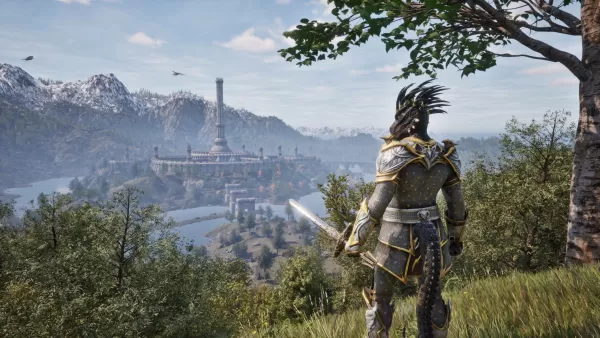By Azura, by Azura, by Azura – the rumors were true. Bethesda has set the gaming world ablaze with the unexpected release of Virtuos' remaster of The Elder Scrolls IV: Oblivion. This surprise 'Elder Scrolls Direct' event has not only captured the hearts of fans but also seen hundreds of thousands of players dive back into the beloved world of Tamriel. In a time when Bethesda Game Studios has been navigating the choppy waters of recent releases like Fallout 76 and Starfield, this nostalgic return feels like a beacon of hope. The RPG landscape has grown fiercely competitive, with titles like Larian Studios' Baldur's Gate 3 and Obsidian's The Outer Worlds series earning accolades as spiritual successors to Elder Scrolls and Fallout. Yet, with Elder Scrolls 6 and Fallout 5 still years away, this remaster of Oblivion could be the stepping stone Bethesda needs to rekindle the magic that once defined them.
At its zenith, Bethesda Game Studios was a titan in the RPG genre. Data from Microsoft's leaked FTC documents in 2020 showed that Fallout 4 had sold an impressive 25 million units, with over 5 million units sold in its first week alone, according to VGChartz. In 2023, Todd Howard announced that Skyrim had surpassed 60 million sales, though its multiple re-releases undoubtedly contributed to this figure. In contrast, Starfield, despite its ambitious scope, has only managed to sell around three million units a year and a half after launch. Even with the boost from Game Pass subscribers and the absence of a PlayStation version, these numbers might be a cause for concern for Bethesda. The game's dedicated fanbase, while present, is smaller compared to the legions that follow Elder Scrolls and Fallout, and has expressed dissatisfaction with the first expansion, Shattered Space.
This leaves Bethesda with a significant challenge: how to recapture the hearts of their fans with Elder Scrolls 6 and Fallout 5 still on the distant horizon? The solution might just lie in revisiting their storied past.
Rumors of an Oblivion remaster surfaced in September 2023, sparked by leaked Microsoft documents hinting at several unannounced Bethesda projects, including this 2006 classic. The buzz continued into January 2025, when a former Virtuos employee leaked further details, stirring excitement and skepticism among fans. The official reveal last week sent the internet into a frenzy, with over 6.4 million Google searches for 'The Elder Scrolls IV: Oblivion' in the past week alone—a staggering 713% increase. Bethesda's reveal livestream peaked at over half a million viewers, and despite the leaks, more than 600,000 tuned in to witness the unveiling of this 19-year-old game's revival. The fervor for the remaster was so intense that it caused sites like CDKeys to crash, while Fanatical and Green Man Gaming struggled to keep up with demand. As of yesterday, Steam reported 125,000 concurrent players, with the game topping the best-seller charts. The enthusiasm for Oblivion burns as brightly as the fires from the Oblivion gates themselves.
The message from players is crystal clear: if Bethesda rebuilds it, they will come. Engaging fans during these long development cycles could be as simple as inviting them back to the enchanting lands of Morrowind or the post-apocalyptic ruins of the East Coast. From a business perspective, this strategy is sound. While Bethesda's core team focuses on new, time-consuming projects, partners like Virtuos can craft remasters based on proven classics in a shorter timeframe. These games come with established audiences and often serve as the first RPGs for many players in their respective generations. By remastering these titles, Bethesda not only rekindles the passion of existing fans but also introduces new players to the rich world of Tamriel and beyond.
Bethesda has already leveraged its catalog effectively. During the first season of the Fallout TV show on Prime Video, Fallout 4 saw a discount of up to 75%, coupled with a next-gen update that included homages to the show. This strategic move resulted in a 7,500% sales surge in Europe, proving the enduring appeal of Bethesda's older titles.

Oblivion Remastered offers a journey to the past that feels like a glimpse into the future. Image credit: Bethesda / Virtuos
Looking back at Microsoft's leaked Bethesda roadmap, many noticed a planned Fallout 3 remaster following Oblivion by two years. Although the original timeline cited Oblivion's release for fiscal year 2022, the gaps between projects seem to have shifted. If these intervals hold true, a Fallout 3 remake might be slated for 2026, aligning perfectly with the second season of the Fallout TV series, which focuses on New Vegas. Given Bethesda's close collaboration with the show's creators, Graham Wagner and Geneva Robertson-Dworet, and the thematic parallels between the first season and Fallout 4, it's not far-fetched to imagine a New Vegas remaster announcement coinciding with the season finale of the show's second season.
The resounding message from the community is that if Bethesda rebuilds it, they will come. However, if there's one title in Bethesda's library that truly deserves a remake, it's The Elder Scrolls III: Morrowind. Fans have been clamoring for this for years, with some even taking matters into their own hands by remaking it with Skyrim's tools, as seen in projects like Skyblivion. Yet, remaking Morrowind poses unique challenges. It's a bridge between Bethesda's past and present, with a distinct structure that differs from modern Elder Scrolls games. It's only partially voiced, relies heavily on text for storytelling, lacks quest markers, and features rudimentary combat mechanics. While Virtuos managed to enhance Oblivion's less polished elements, Morrowind's entire framework is a delicate balance of nostalgia and antiquated systems. Remaking it requires a careful approach to preserve its essence without alienating new players or disappointing long-time fans.
AnswerSee ResultsWhen a studio becomes synonymous with a gaming genre, the challenge is to innovate while retaining their audience. Rockstar Games has managed this with Grand Theft Auto through the expansive world of GTA Online, which supports the rumored hefty budget for GTA 6. Bethesda, known for its deeply immersive, single-player worlds, faces a different challenge. Elder Scrolls Online and Fallout 76, while successful, do not capture the same magic as their single-player counterparts. However, the overwhelming response to the Oblivion remaster suggests that fans are eager to return to Bethesda's classic titles. This remaster is a testament to thoughtful development and careful consideration, unlike some less successful remasters, such as Rockstar's GTA Definitive Editions. For Bethesda, breathing new life into its old classics might just be the key to regaining its crown as the king of modern RPGs.








